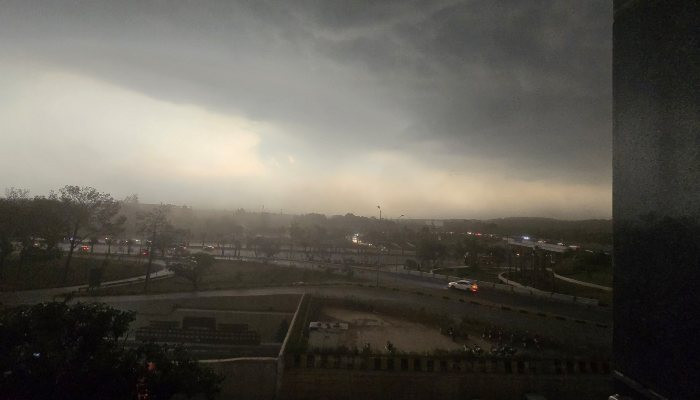Heavy Rainfall and Strong Winds Bring Relief to Islamabad and Rawalpindi
Islamabad and Rawalpindi experienced significant weather changes on Saturday, with robust winds and substantial rainfall offering a respite from the recent intense heatwave.
In certain areas of Islamabad, including Aabpara, the rainfall was accompanied by hailstorms. The accumulation of rainwater led to inundation of several residences, creating challenges for local inhabitants.
Prior to the shift in weather conditions, dark clouds gathered over the capital, followed by strong gusts and a notable decrease in ambient temperature. The Pakistan Meteorological Department (PMD) reported rainfall measurements of 29mm in Shamsabad, 30mm at the PMD station, and 10mm in Golra, Rawalpindi.
Officials from the Water and Sanitation Agency (Wasa) have stated that the water levels in Nullah Lai remained at normal levels. As a precautionary measure, personnel and machinery were strategically positioned in vulnerable low-lying areas. Roadways in Islamabad witnessed water accumulation, prompting police intervention to aid commuters.
Heavy downpours and fierce winds in Neelum Valley, Azad Kashmir, instigated a landslide at Barian Seri, resulting in the obstruction of the Neelum Highway. Light rainfall was also reported in certain sectors of Abbottabad.
Peshawar experienced partly cloudy conditions, with temperatures reaching 35°C. The PMD has indicated potential for additional rainfall within the next day, with anticipated temperature increases up to 39°C.
Showers and thunderstorms are anticipated in the evening across the plains and higher elevations of Khyber Pakhtunkhwa.
This weather event occurs approximately one month after a severe hailstorm impacted the federal capital and regions of KP, causing widespread destruction.
The abrupt and potent weather phenomenon, lasting roughly 35 minutes in Islamabad, featured intense winds and unusually large hailstones, leading to extensive damage and interruptions.
The prior hailstorm shattered vehicle windshields, inflicted damage on solar panel installations, and decimated numerous tree limbs, scattering debris across roads and properties. The impact was notably pronounced in Islamabad areas like Tarnol, where strong winds uprooted a multitude of trees, causing major traffic disruptions and road blockages.



Comments (0)
No comments yet. Be the first to comment!
Leave a Comment